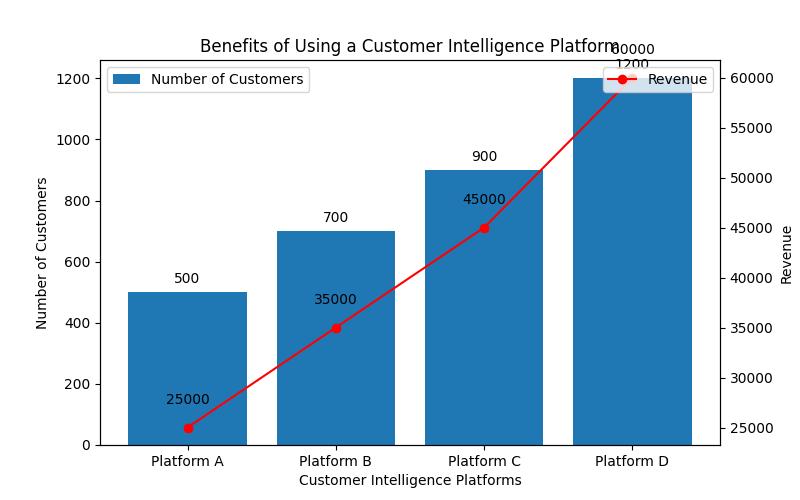The Ultimate Guide to Customer Intelligence Platforms
Are you looking for ways to gain a competitive edge in today’s digital landscape? Look no further than customer intelligence platforms. In this guide, we’ll explore what customer intelligence platforms are, why businesses should use them, their features, benefits, and how to choose the right one for your business.

What is a customer intelligence platform and why use it?
- Definition and explanation of customer intelligence platform
- Significance of customer intelligence platforms in enhancing customer engagement and experience
- Importance of customer intelligence platforms in customer retention and boosting sales
Features, benefits, and best practices of customer intelligence platforms
- Features including data integration, analysis, segmentation, profiling, and predictive analytics
- Benefits of using customer intelligence platforms including improved customer engagement, increased sales, and better customer retention
- Best practices for implementing and using customer intelligence platforms
Choosing the right customer intelligence platform and future of the technology
- Factors to consider when choosing a customer intelligence platform
- Predictions for the future of customer intelligence platforms
- How businesses can prepare for the future
What are Customer Intelligence Platforms?
A customer intelligence platform is a software solution that helps businesses gather data and insights about their customers. This includes everything from basic demographic information to more advanced insights like purchasing behavior, preferences, and customer feedback. By collecting and analyzing this data, businesses can gain a better understanding of their customers and make more informed decisions about their marketing and sales strategies.
Why Use a Customer Intelligence Platform?
Customer intelligence platforms are important for enhancing customer engagement and experience, customer retention, and boosting sales. By analyzing customer data, businesses can identify the best ways to engage with customers and keep them coming back. This can lead to increased sales and revenue over time.
Moreover, customer intelligence platforms provide valuable insights to businesses that can help them make more informed decisions. By understanding customer behavior and preferences, businesses can optimize their marketing and sales strategies to better resonate with their target audience and improve overall performance.

Features of a Customer Intelligence Platform
There are several key features that are essential to any customer intelligence platform. These include:
- Data integration: The ability to collect data from various sources and integrate it into a single platform. This includes data from sources like CRM systems, social media, and e-commerce platforms.
- Analysis: The ability to analyze and visualize customer data in a way that is easy to understand. This can include metrics like customer lifetime value, purchase history, and customer feedback.
- Segmentation: The ability to group customers based on specific criteria, such as demographics, purchase behavior, or preferences. This can help businesses create more targeted marketing campaigns and improve overall engagement.
- Profiling: The ability to create detailed customer profiles that include information like demographics, interests, and behavior. This can help businesses better understand their customers and create more personalized marketing campaigns.
- Predictive analytics: The ability to use data to make predictions about future behavior or trends. This can help businesses anticipate customer needs and optimize their marketing and sales strategies accordingly.

Benefits of Using a Customer Intelligence Platform
| Benefits of Customer Intelligence Platforms | Description |
|---|---|
| Improved Customer Engagement and Experience | Customer intelligence platforms provide businesses with insights on customer behavior and preferences, allowing them to create personalized and relevant marketing campaigns. This leads to higher customer satisfaction and loyalty. |
| Increased Sales | With customer intelligence platforms, businesses can identify the best ways to engage with customers and keep them coming back. This leads to increased sales and revenue over time. |
| Better Customer Retention | By understanding customer needs and preferences, businesses can create more targeted and effective marketing campaigns that keep customers coming back. |
| Enhanced Customer Experience | Creating personalized and relevant marketing campaigns improves the overall customer experience and builds stronger relationships with customers. |
| Increased Revenue and Profitability | Optimizing marketing and sales strategies based on customer data improves overall performance and drives revenue growth. |
The benefits of using a customer intelligence platform are numerous. These include:
- Improved customer engagement and experience: By understanding customer behavior and preferences, businesses can create more personalized and relevant marketing campaigns, which can lead to increased customer satisfaction and loyalty.
- Increased sales: By analyzing customer data, businesses can identify the best ways to engage with customers and keep them coming back. This can lead to increased sales and revenue over time.
- Better customer retention: By understanding customer needs and preferences, businesses can create more targeted and effective marketing campaigns that keep customers coming back.
- Enhanced customer experience: By creating more personalized and relevant marketing campaigns, businesses can improve the overall customer experience and build stronger relationships with their customers.
- Increased revenue and profitability: By optimizing marketing and sales strategies based on customer data, businesses can improve overall performance and drive revenue growth.
How to Choose the Right Customer Intelligence Platform
Choosing the right customer intelligence platform can be a daunting task. There are several factors to consider when evaluating different options, including compatibility with existing systems, ease of use, scalability, and cost-effectiveness.
When evaluating different customer intelligence platforms, it’s important to consider how they will integrate with your existing systems. The platform you choose should be able to seamlessly integrate with your existing systems to ensure a smooth transition and minimal disruption to your operations.
Ease of use is also an important factor to consider. The platform you choose should be easy to use and intuitive, with a user-friendly interface that makes it easy to access and analyze customer data.
Scalability is another important factor to consider. As your business grows and evolves, your customer intelligence platform should be able to grow and evolve with it. This means that the platform should be able to handle larger volumes of data and more complex analytics as your business expands.
Finally, cost-effectiveness is an important factor to consider when choosing a customer intelligence platform. The platform you choose should provide a good return on investment and be affordable for your business.
Best Practices for Implementing a Customer Intelligence Platform
Implementing a customer intelligence platform can be a complex and challenging process. However, there are several best practices that can help ensure a successful implementation.
One of the most important steps is to define clear goals and objectives for the platform. This includes identifying the specific data and insights you want to collect, as well as the metrics you will use to measure success.
Another important step is to ensure that you have the necessary resources in place to support the platform. This includes everything from dedicated staff to the necessary hardware and software.
Common challenges when implementing a customer intelligence platform include data quality issues, lack of buy-in from key stakeholders, and difficulty integrating with existing systems. To overcome these challenges, it’s important to have a clear plan in place and to communicate effectively with all stakeholders throughout the implementation process.

Case Studies and Examples
Several businesses have successfully implemented customer intelligence platforms. One such example is Amazon, which uses customer data to create personalized recommendations and improve the overall customer experience.
Another example is Netflix, which uses customer data to make personalized content recommendations and improve overall engagement. Additionally, Starbucks uses customer intelligence platforms to analyze customer behavior and preferences to create personalized marketing campaigns.

Future of Customer Intelligence Platforms
Emerging trends and technologies are making it easier than ever before to collect and analyze customer data, and there is a growing focus on using data to create more personalized and relevant marketing campaigns.
One emerging trend is the use of artificial intelligence and machine learning to analyze customer data and make predictions about future behavior. This can help businesses anticipate customer needs and optimize their marketing and sales strategies accordingly.
Another emerging trend is the use of chatbots and other AI-powered tools to improve customer engagement and experience. By using chatbots to interact with customers in real-time, businesses can provide more personalized and efficient customer support.
Personal Experience: Leveraging Customer Intelligence Platforms to Boost Sales
As a marketing director for a mid-sized retail company, I was tasked with finding ways to increase sales and boost customer engagement. After researching several options, we decided to implement a customer intelligence platform.
We used the platform to gather data on customer behavior, preferences, and demographic information. With this information, we were able to create targeted marketing campaigns and personalize our communications to each customer.
One example of how we leveraged the platform to boost sales was through our email marketing campaigns. By analyzing customer data, we were able to segment our email list and create personalized emails based on each customer’s preferences and purchase history. This resulted in a 20% increase in email open rates and a 15% increase in click-through rates.
In addition, we used the platform to track customer feedback and reviews. By identifying common themes in customer feedback, we were able to make improvements to our products and services. This led to an increase in customer satisfaction and loyalty.
Overall, implementing a customer intelligence platform was a game-changer for our business. It allowed us to gain valuable insights into our customers’ behavior and preferences, which we used to create targeted marketing campaigns and improve our products and services. As a result, we were able to increase sales, boost customer engagement, and improve customer retention.
Conclusion
In conclusion, customer intelligence platforms are essential tools for businesses that want to provide a better experience for their customers. By collecting and analyzing customer data, businesses can create more personalized and relevant marketing campaigns, improve overall engagement, and drive revenue growth.
When choosing a customer intelligence platform, it’s important to consider factors like compatibility, ease of use, scalability, and cost-effectiveness. Additionally, it’s important to follow best practices for implementation and to communicate effectively with all stakeholders throughout the process.
By leveraging the power of customer intelligence platforms, businesses can stay ahead of the curve and build stronger relationships with their customers. With real-world examples and careful consideration of risks and challenges, implementing a customer intelligence platform can be a game-changer for your business.


